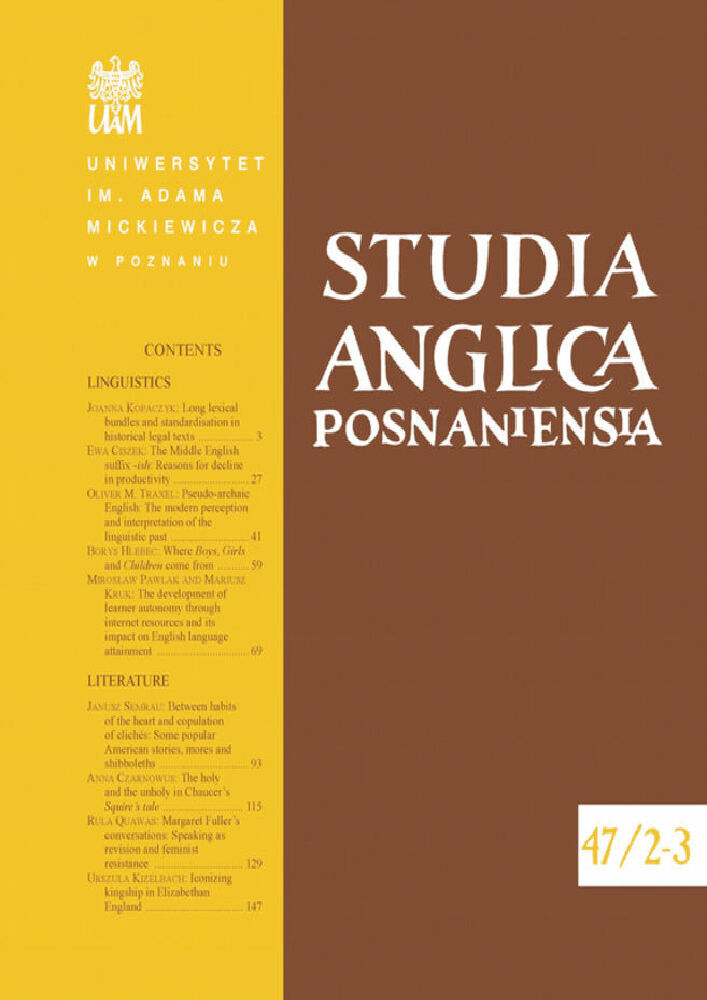Abstract
The present article offers a critical reading of the Old English Exodus, a poem that is an Old English versified adaptation of an episode from the biblical story of Exodus that narrates Israelites’ passage across the Red Sea and the destruction of Pharaoh’s army. The aim of this article is to analyse the poem’s urban and exilic imagery that strongly relies on the metaphorical representation of the Israelites as a city, as they are actually in exile and on the way to Canaan, and of the metaphorical representation of the walls of the Red Sea as the walls of a hall that is destroyed along with the Egyptian army. The argument of the present article is that in Exodus the poet uses the imagery of a hall and exile, derived from heroic and secular verse, as a hermeneutic key to read the biblical exodus typologically, tropologically, and anagogically. The metaphor of the key that opens the Scripture, which the poet uses in Exodus, encourages the reader to unveil the hidden meaning of the narrative. The poet inverts the conventional imagery of the hall and exile in the poem to emphasise narrative moments that require the reader to explore the letter of the poem for additional layers or signification.References
Anlezark, Daniel (ed.). 2011. Old Testament narratives. Harvard University Press.
Augustine. 1997. On Christian teaching (translated by R. P. H. Green). Oxford University Press.
Augustine. 2003. City of God (translated by Henry Bettenson). Penguin Books.
Bede. 2006. On Ezra and Nehemiah. Liverpool University Press.
Bede. 2008. On Genesis (translated by Calvin B. Kendall.). Liverpool University Press.
Bjork, Robert R. (ed.). 2014. Old English shorter poems. Vol. II: Wisdom and lyric. Harvard University Press.
Irving, Edward B, (ed.). 1953. The Old English Exodus. Yale University Press.
Lucas, Peter J. (ed.). 2020. Exodus (3rd edn). Liverpool University Press.
North, Richard & Michael D. J. Bintley (eds.). 2016. Andreas: An edition. Liverpool University Press.
Anlezark, Daniel. 2006. Water and fire: The myth of the flood in Anglo-Saxon England. Manchester University Press. DOI: https://www.doi.org/10.7765/9781526129659
Baker, John & Stuart Brooks. 2013. Beyond the burghal hidage: Anglo-Saxon civil defence in the Viking Age. Brill.
Bammesberger, Alfred. 2013. Old English hēofon þider becōm (Exodus, 46B). Neuphilologische Mitteilungen 114(3). 275–278.
Claussen, Martin A. 1991. ‘Peregrinatio’ and ‘peregrini’ in Augustine’s ‘City of God’. Traditio 46. 33–75. DOI: https://www.doi.org/10.1017/S0362152900004190
Discenza, Nicole Guenther. 2017. Inhabited spaces: Anglo-Saxon construction of space. Toronto University Press.
Draper, Simon. 2008. The significance of Old English burh in Anglo-Saxon England. Anglo-Saxon Studies in Archaeology and History 15. 240–253. DOI: https://www.doi.org/10.2307/j.ctvh1dw9r.8
Earl, James W. 1970. Christian tradition in the OE ‘Exodus’. Neuphilologische Mitteilungen 71(4). 541–570.
Ferhatović, Denis. 2019. Borrowed objects and the art of poetry: Spolia in Old English verse. Manchester University Press. DOI: https://www.doi.org/10.7765/9781526131669
Garner, Lori Ann. 2011. Structuring spaces: Oral poetics and architecture in early medieval England. Notre Dame University Press.
Greenfield, Stanley B. 1989: Hero and exile: The art of Old English poetry. The Hambledon Press. Hopkins, Stephen C. E. 2018. Snared by the beasts of battle: Fear as hermeneutic guide in the Old English Exodus. Philological Quarterly 97(1). 1–25.
Howe, Nicholas. 1989. Migration and mythmaking in Anglo-Saxon England. Yale University Press.
Howe, Nicholas. 2008. Writing the map of Anglo-Saxon England: Essays in cultural geography. Yale University Press.
Hume, Kathryn. 1974. The concept of the hall in Old English poetry. Anglo-Saxon England 3. 63–74. DOI: https://www.doi.org/10.1017/S0263675100000582
Lapidge, Michael. 2006. The Anglo-Saxon library. Oxford University Press. DOI: https://www.doi.org/10.1093/acprof:oso/9780199239696.001.0001
Luria, Maxwell. 1981. The Old English Exodus as a Christian poem: Notes towards a reading. Neophilologus 65(4). 600–606.
Michelet, Fabienne L. 2011. Lost at sea: Nautical travels in the Old English Exodus, the Old English Andreas, and the accounts of the adventus Saxonum. In Sebastian I. Sobecki (ed.), The sea and Englishness in the Middle Ages: Maritime narratives, identity and culture, D. S. Brewer. 59–80.
Parsons, David N. & Tania Styles. 2000. The vocabulary of English place-names: Brace – Cæster. Nottingham: Centre for English Names Studies.
Sharma, Manish. 2011. The economy of the word in the Old English Exodus. In Michael Fox & Manish Sharma (eds.), Old English literature and the Old Testament, University of Toronto Press. 172–194. DOI: https://www.doi.org/10.3138/9781442664296-007
Vickrey, John F. 1972. ‘Exodus’ and the battle in the sea. Traditio 28. 119–140.
Walton, Audrey. 2013. “Gehyre se ðe wille”: The Old English Exodus and the reader as exegete. English Studies 94(1). 1–10. DOI: https://www.doi.org/10.1080/0013838X.2012.739811
Wilcox, Miranda. 2011. Creating the cloud-tent-ship conceit in Exodus. Anglo-Saxon England 40. 103–150. DOI: https://www.doi.org/10.1017/S026367511100007X
Zacher, Samantha. 2013. Rewriting the Old Testament in Anglo-Saxon verse: Becoming the chosen people. Bloomsbury.
